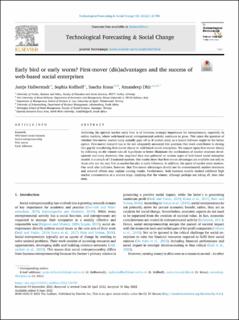| dc.contributor.author | Halberstadt, Jantje | |
| dc.contributor.author | Kollhoff, Sophia | |
| dc.contributor.author | Kraus, Sascha | |
| dc.contributor.author | Dhir, Amandeep | |
| dc.date.accessioned | 2023-03-31T12:27:20Z | |
| dc.date.available | 2023-03-31T12:27:20Z | |
| dc.date.created | 2022-09-21T12:31:14Z | |
| dc.date.issued | 2022 | |
| dc.identifier.citation | Halberstadt, J., Kollhoff, S., Kraus, S., & Dhir, A. (2022). Early bird or early worm? First-mover (dis) advantages and the success of web-based social enterprises. Technological Forecasting and Social Change, 181, 121784. | en_US |
| dc.identifier.issn | 0040-1625 | |
| dc.identifier.uri | https://hdl.handle.net/11250/3061481 | |
| dc.description.abstract | Achieving the optimal market entry time is of immense strategic importance for entrepreneurs, especially in online markets, where web-based social entrepreneurial activity continues to grow. This raises the question of whether first-mover market entry actually pays off or if market entry as a (later) follower might be the better option. First-mover research has so far not adequately answered this question. Our work contributes to closing this gap by transferring first-mover theory to web-based social enterprises. We expand upon first-mover theory by reflecting on the winner-take-all hypothesis to better illuminate the mechanisms of market structure development and entry decisions. Our empirical data was gathered on various types of web-based social enterprise models in a sample of 12 national markets. Our results show that first-mover advantages are available not only to those who are the very first to market but also to early followers. In addition, the speed of market entry matters. Our work also indicates, however, that first-mover advantages should not be overestimated; market structures and network effects may explain varying results. Furthermore, both business models studied exhibited high market concentration at a mature stage, implying that the winner, although perhaps not taking all, does take most. | en_US |
| dc.language.iso | eng | en_US |
| dc.publisher | Elsevier | en_US |
| dc.rights | Navngivelse 4.0 Internasjonal | * |
| dc.rights.uri | http://creativecommons.org/licenses/by/4.0/deed.no | * |
| dc.title | Early bird or early worm? First-mover (dis)advantages and the success of web-based social enterprises | en_US |
| dc.type | Peer reviewed | en_US |
| dc.type | Journal article | en_US |
| dc.description.version | publishedVersion | en_US |
| dc.rights.holder | The authors | en_US |
| dc.subject.nsi | VDP::Samfunnsvitenskap: 200 | en_US |
| dc.source.volume | 181 | en_US |
| dc.source.journal | Technological Forecasting and Social Change | en_US |
| dc.identifier.doi | 10.1016/j.techfore.2022.121784 | |
| dc.identifier.cristin | 2053883 | |
| cristin.ispublished | true | |
| cristin.fulltext | original | |
| cristin.qualitycode | 1 | |

